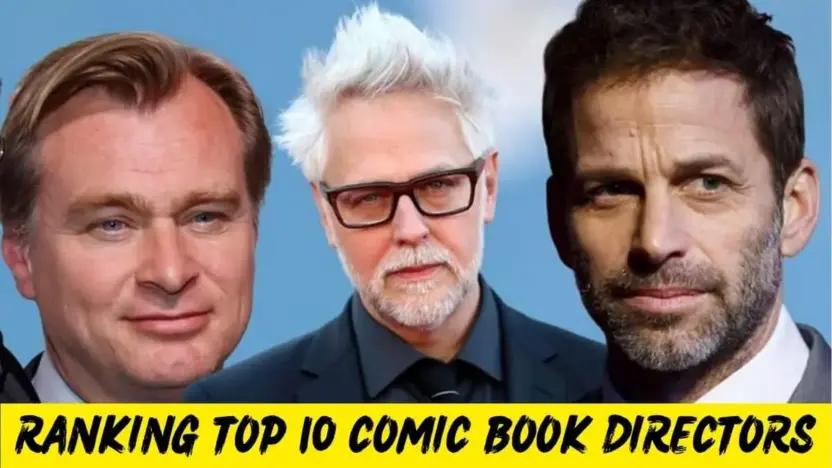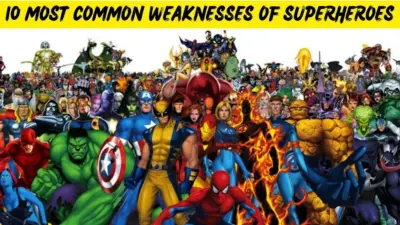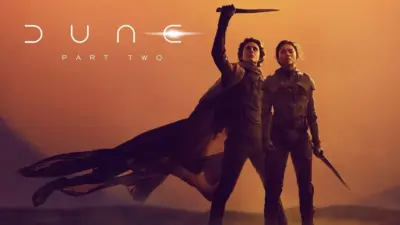In the ever-expanding universe of comic book cinema, a few visionary directors have left an indelible mark, redefining the genre and captivating audiences worldwide. From the gritty streets of Gotham to the cosmic expanse of the Marvel Universe, these filmmakers have transformed colorful pages into cinematic masterpieces. In this article we’re ranking the top 10 comic book directors, celebrating their groundbreaking contributions and the unforgettable stories they’ve brought to life on the silver screen.
Ranking Top 10 Comic Book Directors
1. Sam Raimi

The director Sam Raimi is renowned for injecting his unique blend of horror sensibilities and campy humor into the comic book genre, most famously through his Spider-Man trilogy. Spider-Man (2002) redefined superhero movies with its heartfelt storytelling and groundbreaking visuals, making it a cultural landmark.
Spider-Man 2 (2004) is often cited as one of the best superhero films ever made, thanks to its compelling villain and deeper exploration of the hero’s personal sacrifices. Though Spider-Man 3 (2007) received mixed reviews, it showcased Raimi’s ambition to blend multiple narratives and characters. Raimi’s influence extends beyond these films, as his approach to character-driven storytelling and visual innovation has left a lasting impact on how superhero stories are told on screen.
2. James Gunn

With the distinct blend of irreverent humor, heartfelt character development, and eclectic soundtracks, James Gunn, has made a name for himself in the comic book movie genre. With Marvel’s Guardians of the Galaxy (2014) and its sequel Guardians of the Galaxy Vol. 2 (2017), Gunn transformed a relatively unknown group of characters into some of the most beloved heroes in the Marvel Cinematic Universe.
His ability to balance action, comedy, and emotional depth, all while exploring themes of family and redemption, resonated with audiences worldwide. Gunn’s work with DC’s The Suicide Squad (2021) further solidified his status as a versatile director capable of reinvigorating franchises with his unique vision, blending dark humor with a more mature thematic approach to superhero storytelling.
3. Christopher Nolan

Christopher Nolan revolutionized the superhero film genre with his Dark Knight trilogy, imbuing it with a level of sophistication and realism previously unseen. Batman Begins (2005) redefined the origin story, blending intense character study with a realistic portrayal of Gotham City. The Dark Knight (2008) is hailed as a masterpiece, thanks in part to its complex villain, the Joker, and its exploration of themes such as chaos, morality, and heroism.
The Dark Knight Rises (2012) concluded the trilogy on an epic scale, addressing the consequences of heroism and the nature of true sacrifice. Nolan’s insistence on practical effects, coupled with his thematic depth and narrative complexity, has not only influenced the way superhero stories are told but also raised audience expectations for the genre as a whole.
4. The Russo Brothers (Joe and Anthony)

Collectively known as the Russo Brothers, Joe and Anthony Russo have become synonymous with some of the most pivotal and box-office-shattering films in the Marvel Cinematic Universe (MCU). They directed Captain America: The Winter Soldier, which was praised for its gritty, espionage-thriller tone, significantly differing from other MCU films.
Their storytelling prowess was further solidified with Captain America: Civil War, which managed to balance a large ensemble cast while introducing pivotal characters like Spider-Man and Black Panther. However, it was with Avengers: Infinity War and Avengers: Endgame that the Russo Brothers cemented their legacy, masterfully weaving together multiple story arcs into a climactic battle against Thanos, making Endgame one of the highest-grossing films of all time.
5. James Mangold

Carving out a distinct niche for himself in the realm of comic book adaptations, James Mangold brought a more mature, character-driven approach to the genre. His most notable contribution is Logan, a raw and emotionally charged farewell to Hugh Jackman’s Wolverine. Set in a near-future where mutants are nearly extinct, Logan stands apart for its gritty realism, depth of character, and its willingness to explore themes of aging, loss, and redemption.
The film’s critical and commercial success underscored Mangold’s ability to transcend traditional superhero tropes, offering a poignant, visceral narrative that resonates with audiences beyond the comic book fan base. Additionally, his direction of The Wolverine showcased his skill in blending action with deep character exploration, setting the stage for his later success with Logan.
6. Zack Snyder

The distinctive visual style and ambitious narrative scope of Zack Snyder have significantly influenced the comic book movie genre. His work on 300, an adaptation of Frank Miller’s graphic novel, showcased his talent for translating the dynamic aesthetics of comic books to the big screen. However, it is his contributions to the DC Extended Universe (DCEU) that have left an indelible mark.
Starting with Man of Steel, Snyder reimagined Superman for a new generation, infusing the film with his signature visual flair and a more grounded, complex portrayal of the iconic character. Batman v Superman: Dawn of Justice expanded the DCEU, introducing Batman and Wonder Woman, setting the stage for Snyder’s vision of a larger interconnected universe. Despite mixed reviews, Snyder’s passionate fan base and his ambitious director’s cut of Justice League have underscored his impact on the genre.
7. Brad Bird

Renowned for his mastery in blending heartfelt storytelling with innovative animation, Brad Bird made a significant impact on the superhero genre with The Incredibles (2004) and its sequel The Incredibles 2 (2018). These films, celebrated for their exploration of family dynamics within a superhero framework, showcase Bird’s ability to marry relatable, human emotions with the fantastical elements of superhero lore.
Bird’s direction emphasizes the challenges and triumphs of a family struggling to balance ordinary life with their superhuman abilities, making both movies resonate with audiences of all ages. His work stands out for its attention to character development, sophisticated humor, and visually stunning action sequences, setting a high standard for animated superhero films.
8. Jon Watts

Injecting a youthful energy and modern sensibility into the story of Peter Parker Jon Watts brought a fresh perspective to the Spider-Man franchise with Spider-Man: Homecoming (2017) and Spider-Man: Far From Home (2019). By focusing on Peter’s high school life and the challenges of growing up, Watts captures the essence of Spider-Man’s appeal — the relatable struggles of a young superhero.
His direction skillfully balances action-packed sequences with the comedic and heartfelt moments of adolescence, reinvigorating the character for a new generation of fans. Watts’ contribution to the Spider-Man legacy is marked by his ability to blend the superheroic with the everyday, making the extraordinary experiences of Peter Parker feel incredibly real.
9. Tim Burton

Tim Burton’s foray into the comic book genre with Batman (1989) and Batman Returns (1992) brought a gothic, darkly whimsical aesthetic that was revolutionary at the time. Burton’s distinctive style, combining moody, atmospheric visuals with complex characters, redefined Batman for the screen.
His portrayal of Gotham City as a character in its own right, along with his ability to draw out nuanced performances from his cast, particularly Michael Keaton as Batman and Jack Nicholson as the Joker, set a new standard for cinematic adaptations of comic books. Burton’s films are celebrated for their unique vision and contribution to the Batman mythology, influencing how the character has been perceived and portrayed in the decades since.
10. Richard Donner

The director Richard Donner’s Superman (1978) is heralded as a pioneering work in the superhero genre, setting the foundation for all future comic book adaptations. His approach to Superman’s story was groundbreaking, treating the character with seriousness and respect while capturing the wonder and optimism inherent in the comic books.
Donner’s film was a technical marvel of its time, convincing audiences to “believe a man can fly” with its innovative special effects. The movie’s success can also be attributed to its perfect casting, particularly Christopher Reeve as Superman, whose portrayal became iconic. Donner’s vision for Superman as a symbol of hope and his emphasis on character-driven storytelling have made Superman a timeless classic, inspiring generations of filmmakers and fans alike.
Also Read: 10 Marvel Characters Who Can Defeat Superman



